#editorial corruption
Explore tagged Tumblr posts
Text

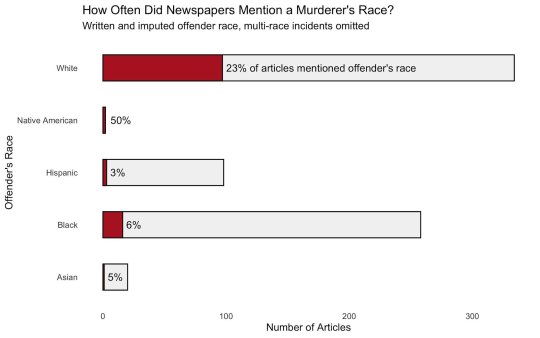
By: Charles Fain Lehman
Published: Apr 14, 2022
Frank James, the man arrested for Tuesday's New York City subway shooting, is a black nationalist and outspoken racist who railed against whites, Jews, and Hispanics. A careful reader of the New York Times could be forgiven for overlooking that. In a nearly 2,000-word article on the attack, James's race is not mentioned. The same is true for the coverage offered up by Reuters; the Washington Post only mentioned James's race in relation to his condemnation of training programs for "low-income Black youths."
Media critics on the right say that the conspicuous omission of James's race from these news reports illustrates a trend among prestige papers, which deemphasize or omit the race of non-white criminals while playing up the race of white offenders. But is it a real pattern?
Yes. A Washington Free Beacon review of hundreds of articles published by major papers over a span of two years finds that papers downplay the race of non-white offenders, mentioning their race much later in articles than they do for white offenders. These papers are also three to four times more likely to mention an offender's race at all if he is white, a disparity that grew in the wake of George Floyd's death in 2020 and the protests that followed.
The Free Beacon collected data on nearly 1,100 articles about homicides from six major papers, all written between 2019 and 2021. Those papers included the Chicago Tribune, Los Angeles Times, New York Times, Philadelphia Inquirer, San Francisco Chronicle, and Minneapolis's Star-Tribune—representatives of each paper did not return requests for comment for this article. For each article, we collected the offender's and victim's name and race, and noted where in the article the offender's race was mentioned, if at all.
The data suggest an alarming editorial trend in which major papers routinely omit information from news reports, presenting readers with a skewed picture of who does and doesn't commit crime. These editorial choices are part and parcel with the "racial reckoning" that swept newsrooms in the wake of Floyd's murder, which saw journalists dramatically overhauling crime coverage to emphasize the view that the criminal justice system is racist at the root—perhaps at the expense of honesty about individual offenders' crimes.

The chart above indicates that papers are far quicker to mention the race of white murderers than black. (Those two races account for 92 percent of mentions in the data, so others are not shown.) Half of articles about a white offender mention his race within the first 15 percent of the article. In articles about black offenders, by contrast, mentions come overwhelmingly toward the end of the piece. Half of the articles that mention a black offender's race do not do so until at least 60 percent of the way through, and more than 20 percent save it until the last fifth of the article.
Of course, journalists choose not only where in a piece to mention an offender's race, but also whether to mention it at all, and omissions can skew a reader's perspective.
To measure these choices, we identified the race of the offender in roughly 900 stories where his name, but not his race, was mentioned, first by looking at the race of people with the same name in Census data, and then hand-confirming race based on mug shots or other images published in local news stories.
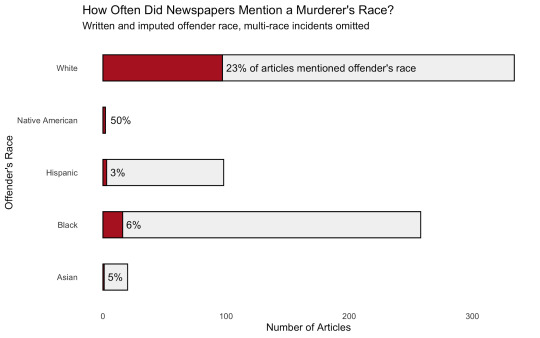
Doing so permits an estimate of how often journalists highlight an offender's race—or don't. Again, the skew is startling: White offenders' race was mentioned in roughly 1 out of every 4 articles, compared with 1 in 17 articles about a black offender and 1 in 33 articles about a Hispanic offender.
This effect is driven in part by a handful of major news stories involving white perpetrators, though the attention paid to these stories is also an editorial choice. But even after omitting reports about white offenders Kyle Rittenhouse, Derek Chauvin, and the killers of Ahmaud Arbery, the race of white offenders is mentioned in 16 percent of cases, two to three times the rate at which the race of black offenders is mentioned. (Middle Eastern offenders were labeled as Asian in this analysis, but labeling them as white results in only a small change to the race mention rate.)

This disparity widened following George Floyd's murder. Before May of 2020, papers were roughly twice as likely to mention the race of a white (13 percent of stories) versus a black perpetrator (7 percent). After May of 2020, the numbers were 28 percent and 4 percent, a ratio of seven to one. Even omitting the above-mentioned stories, papers still mentioned race in 23 percent of stories about white killers post-Floyd, a six-to-one ratio.
It could be that there were more stories in which a white offender's race was relevant after Floyd's death than before. But it is also easy to see how the increased attention to white murderers represents a change in what reporters and editors thought it was, and was not, important for their readers to hear about, particularly after they publicly committed to revamping their crime reporting following Floyd's death.
Newspapers across the country—including the Inquirer—stopped publishing mugshot galleries in part because, two Florida newspapers wrote, they "may have reinforced negative stereotypes." Others committed to overhauling their language, substituting phrases like "formerly incarcerated person" for "felon" to respond to what the Poynter Institute described as an "inextricabl[e]" link between reporting on crime and "race and racism." And the Associated Press amended its style guide to discourage the use of the word "riot," which allegedly has racist connotations.
At the same time, major newsrooms have prioritized "racial justice" coverage, part of a push for what the journalist-cum-activist Wesley Lowery called "moral clarity" over "objectivity": writing news reports that take the sides on contested issues with the goal of advancing a political objective.
Such "moral clarity" may mean downplaying black crime and emphasizing white crime. In the case of offenders like James, it means leaving readers in the dark about an important element of the story—journalistic malfeasance that is, of course, in service of the greater good.
==
You don't hate legacy media enough.
#Charles Fain Lehman#racial reckoning#legacy media#manipulation#propaganda#journalistic integrity#journalistic malpractice#violent crime#moral clarity#editorial corruption
6 notes
·
View notes
Text

When Pigs Fly
#political satire#editorial cartoons#politics#political cartoon#donald trump#trump#cartoon#trump humor#us politics#trump is a moron#trumpism#emoluments clause#qatar#corruption#fuck trump#trump is the enemy of the people#trump administration
28 notes
·
View notes
Text
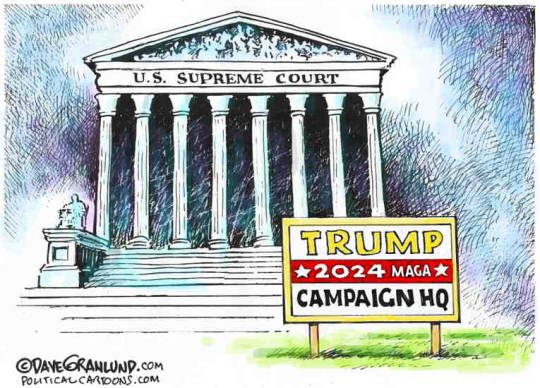
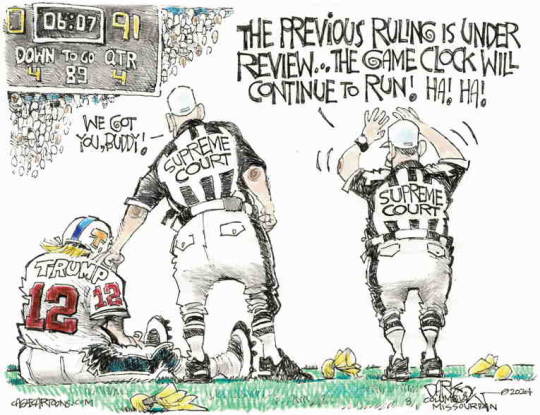
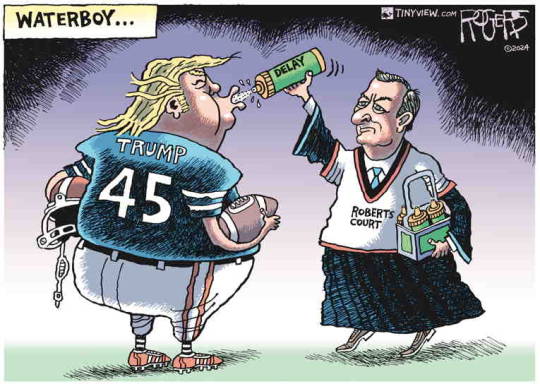
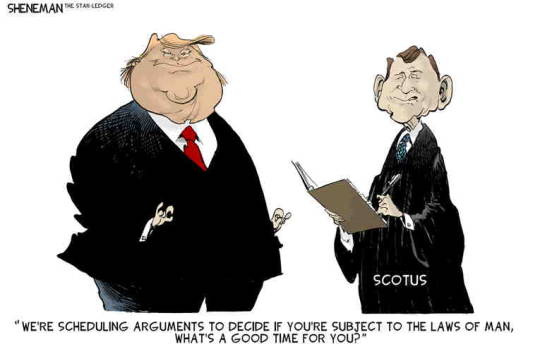

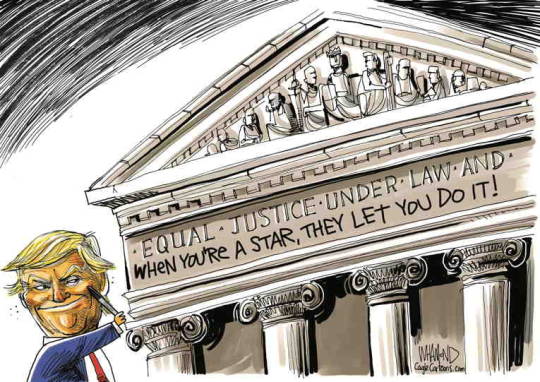
165 notes
·
View notes
Text

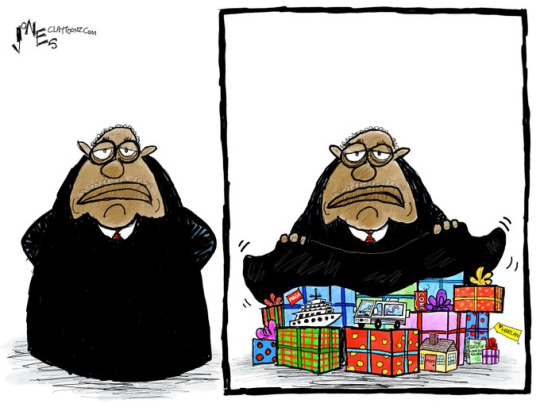
#editorial cartoons#clay jones#clarence thomas#corruption#ethics#scotus#bribes#harlan crow#political cartoon
22 notes
·
View notes
Text
House Republicans censuring Adam Schiff says more about them than him

The Editorial Board of The Washington Post rightly calls out the House Republicans for weaponizing the House to punish one of Trump's enemies, after Trump threatened to primary the 20 Republicans who initially voted against censuring him.
Here are some excerpts from the editorial:
Rep. Adam B. Schiff (D-Calif.) became on Wednesday just the third member of Congress to be censured in the past 40 years. The party-line vote reflected worse on the House Republicans who pushed it through than it did on Mr. Schiff. The resolution accuses the former House Intelligence Committee chairman of falsely claiming that Donald Trump’s 2016 presidential campaign colluded with the Russian government. Mr. Schiff responded that Paul Manafort, as chairman of Mr. Trump’s campaign, provided internal campaign polling data to a Russian intelligence operative amid widespread Kremlin efforts to assist Mr. Trump. Experts can debate whether that technically constitutes collusion. But this semantic question is hardly the basis for a censure motion. Contrary to what many Trump supporters claim, the investigation by Robert S. Mueller III never exonerated Mr. Trump. Indeed, the special counsel’s report laid out significant evidence of obstruction of justice. It’s indisputable that Russia interfered in the 2016 election on Mr. Trump’s behalf. [...] After 20 Republicans voted last week with Democrats to table the censure resolution, Mr. Trump wrote on social media that he’d support primary challengers against them. (Mr. Schiff had spearheaded Mr. Trump’s first impeachment and played a leading role on the select committee that investigated the Jan. 6, 2021, insurrection.) When the resolution came up again Wednesday, this time without a threat to fine Mr. Schiff $16 million, most of those Republicans capitulated. In so doing, they weakened the power of congressional censure as an official rebuke reserved for egregious conduct — and, in the process, made themselves appear to be the wrongdoers. [color emphasis added]
#house republicans#adam schiff#republicans weaponizing congress#trump#house republicans are corrupt#editorial board#the washington post
37 notes
·
View notes
Text
By The Editorial Board
The editorial board is a group of opinion journalists whose views are informed by expertise, research, debate and certain longstanding values. It is separate from the newsroom.
With Donald Trump’s victories on Tuesday, he has moved to the cusp of securing the 1,215 delegates necessary to win the Republican Party’s presidential nomination. The rest is a formality. The party has become a vessel for the fulfillment of Mr. Trump’s ambitions, and he will almost certainly be its standard-bearer for a third time.
This is a tragedy for the Republican Party and for the country it purports to serve.
In a healthy democracy, political parties are organizations devoted to electing politicians who share a set of values and policy goals. They operate part of the machinery of politics, working with elected officials and civil servants to make elections happen. Members air their differences within the party to strengthen and sharpen its positions. In America’s two-party democracy, Republicans and Democrats have regularly traded places in the White House and shared power in Congress in a system that has been stable for more than a century.
The Republican Party is forsaking all of those responsibilities and instead has become an organization whose goal is the election of one person at the expense of anything else, including integrity, principle, policy and patriotism. As an individual, Mr. Trump has demonstrated a contempt for the Constitution and the rule of law that makes him unfit to hold office. But when an entire political party, particularly one of the two main parties in a country as powerful as the United States, turns into an instrument of that person and his most dangerous ideas, the damage affects everyone.
Mr. Trump’s ability to solidify control of the Republican Party and to quickly defeat his challengers for the nomination owes partly to the fervor of a bedrock of supporters who have delivered substantial victories for him in nearly every primary contest so far. Perhaps his most important advantage, however, is that there are few remaining leaders in the Republican Party who seem willing to stand up for an alternative vision of the party’s future. Those who continue to openly oppose him are, overwhelmingly, those who have left office. Some have said they feared speaking out because they faced threats of violence and retribution.
In a traditional presidential primary contest, victory signals a democratic mandate, in which the winner enjoys popular legitimacy, conferred by the party’s voters, but also accepts that defeated rivals and their competing views have a place within the party. Mr. Trump no longer does, having used the primary contest as a tool for purging the party of dissent. The Republican candidates who have dropped out of the race have had to either demonstrate their devotion to him or risk being shunned. His last rival, Nikki Haley, is a Republican leader with a conservative track record going back decades who served in Mr. Trump’s cabinet in his first term. He has now cast her out. “She’s essentially a Democrat,” the former president said the day before her loss in South Carolina. “I think she should probably switch parties.”
Without a sufficient number of Republicans holding positions of power who have shown that they will serve the Constitution and the American people before the president, the country takes an enormous risk. Some of the Republicans who are no longer welcome — such as Adam Kinzinger, Liz Cheney and Mitt Romney — tried to hold their party’s leader accountable to his basic duty to uphold the law. Without such leaders, the Republican Party also loses the capacity to avoid decisions that can hurt its supporters. John McCain, for example, voted to save Obamacare because his party had not come up with an alternative and millions of people otherwise would have lost their health coverage.
A party without dissent or internal debate, one that exists only to serve the will of one man, is also one that is unable to govern.
Republicans in Congress have already shown their willingness to set aside their own priorities as lawmakers at Mr. Trump’s direction. The country witnessed a stark display of this devotion recently during the clashes over negotiations for a spending bill. Republicans have long pushed for tougher border security measures, and Mr. Trump put this at the top of the party’s agenda. With a narrow majority in the House and bipartisan agreement on a compromise in the Senate, Republicans could have achieved this goal. But once Mr. Trump insisted that he needed immigration as a campaign issue, his loyalists in the House ensured that the party would lose a chance to give their voters what they had promised. Even the Senate minority leader, Mitch McConnell, who pushed for the bill for months, ultimately abandoned it and voted against it. He is now considering endorsing Mr. Trump, a man whom he has not spoken to in over three years, according to reporting by Jonathan Swan, Maggie Haberman and Shane Goldmacher of The Times. And last week, Mr. McConnell announced that he would step down from his leadership post.
Similarly, the party appears ready to ditch its promises to support Ukraine and its longstanding commitment to the security of our NATO allies in Europe. When Mr. Trump ranted about getting NATO countries to “pay up” or face his threats to encourage Russia to “do whatever the hell they want” to them, many Republican leaders said nothing.
The Republican Party has long included leaders with widely different visions of America’s place in the world, and many Republican voters may agree with Mr. Trump’s view that the United States should not be involved in foreign conflicts or even that NATO is unimportant. But once competing views are no longer welcome, the party loses its ability to consider how ideas are put into practice and what the consequences may be.
During Mr. Trump’s first term, for example, Secretary of State Mike Pompeo persuaded him not to abruptly withdraw from NATO. If Mr. Trump were to try in a second term, Congress could, in theory, restrain him; in December lawmakers passed a measure requiring congressional approval for any president to leave NATO. But as Peter Feaver pointed out recently in Foreign Affairs, such constraints mean little to a party that has submitted to the “ideological mastery” of its leader. Marco Rubio, one of the authors of that legislation, now insists that he has “zero concern” about Mr. Trump’s comments.
It may be tempting for Americans to dismiss these capitulations as politicians doing whatever it takes to get elected or to ignore Mr. Trump’s bullying of other Republicans and tune out until Election Day. In one recent poll, two-thirds of Americans said they were “tired of seeing the same candidates in presidential elections and want someone new.”
But tuning out is a luxury that no American, regardless of party, can afford. Mr. Trump in 2024 would be the nominee of a very different Republican Party — one that has lost whatever power it once had to hold him in check.
This subservience was not inevitable. After Mr. Trump incited the Jan. 6, 2021, attack on the Capitol, some party leaders, especially in Congress, suggested that they were ready to break with him. The Republican Party’s disappointing results in the 2022 midterm elections appeared to further undermine Mr. Trump’s support, adding doubts about his political potency to the longstanding concerns about his commitment to democracy.
But after Mr. Trump announced his candidacy and it became clear that the multiple indictments against him only strengthened his support, that resistance faded away. He is now using these cases for his own political purposes, campaigning to raise money for his legal defense, and has turned his appearances in court into opportunities to cast doubt on the integrity of the legal system.
U.S. District Judge Tanya Chutkan, who is overseeing the federal Jan. 6 trial, imposed a gag order on him to prevent him from intimidating witnesses. She noted that Mr. Trump’s defense lawyers did not contradict testimony “that when defendant has publicly attacked individuals, including on matters related to this case, those individuals are consequently threatened and harassed.” The leadership of the Republican Party has been silent.
With loyalists now in control of the Republican National Committee and his daughter-in-law, Lara Trump, in line to become its co-chair, the party may soon bend to Mr. Trump’s insistence that the party pay his legal bills. His campaign spent roughly $50 million on lawyers last year, and those expenses are mounting as the trial dates approach. One prominent Republican, Henry Barbour, has sponsored resolutions barring the committee from doing so, but he conceded that the effort can do little more than just make a point.
Mr. Trump has also taken over the party’s state-level machinery. This has allowed him to rewrite the rules of the Republican primary process and add winner-take-all contests, which work in his favor. That is the kind of advantage that political parties normally give incumbents. But in the process, he has divided some state parties into factions, some of which no longer speak to each other. Democrats may see the dysfunction and bickering among Republicans as an advantage. But it also means that for Democrats, even state and local races turn into ones against Mr. Trump. Rather than competing on the merits of policy or ideology, they find themselves running against candidates without coherent positions other than their loyalty to Trumpism.
Republican voters may soon no longer have a choice about their nominee; their only choice is whether to support someone who would do to the country what he has already done to his party.
#NYTimes Editorial board#authoritarianism#Sad Old GOP#corrupt GOP#anti-democratic GOP#wake up#RNC#TFG Legal jeopardy
1 note
·
View note
Text
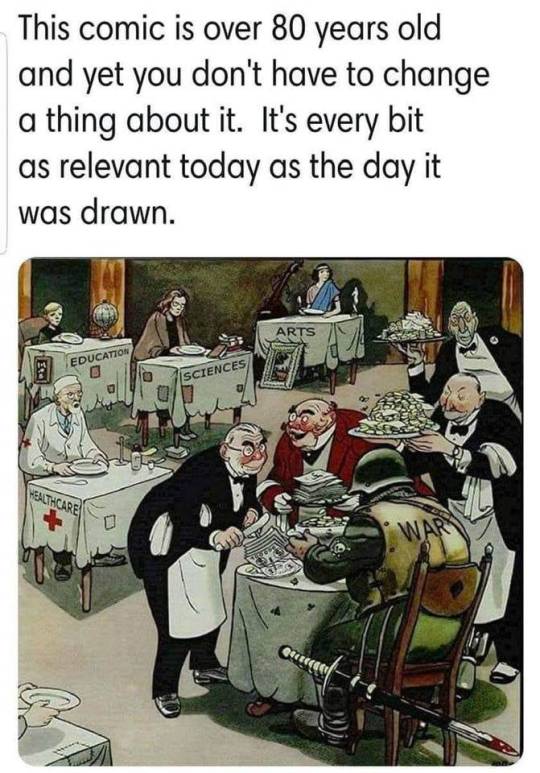
1 note
·
View note
Text
I think "Fallen asleep on," would be more accurate.
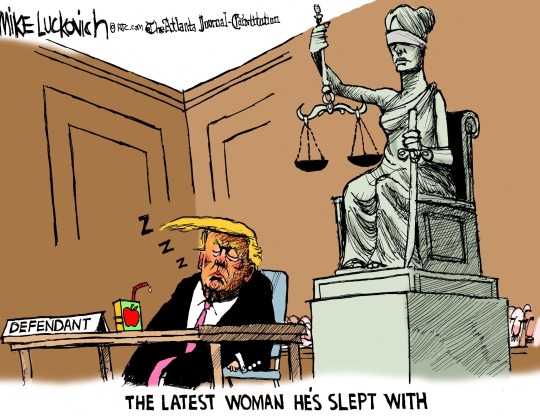
#Mike Luckovich#Editorial Cartoons#crime#EVIL#election interference#merkin von bankrupt#WHAT THE ACTUAL FUCK RETHUGLICANTS?!#rethuglicants#conservative politics#reach complete enlightenment#corruption#screw the people#screw the voters
29 notes
·
View notes
Text
Imagine that Joe Biden, just as he was assuming office, had started a new company with Hunter Biden and used his main social media account to recruit financial backers, then promised that the most generous among them would earn an invitation to a private dinner with him.
Oh, and imagine that these investors were all kept secret from the public, so that we had no idea what kinds of possible conflicts of interest might arise.
Take a minute, close your eyes. Let yourself see Jim Jordan’s face go purple in apoplexy, hear the moral thunder spewing out of Jesse Watters’s mouth, feel the shock (which would be wholly justified) of the New York Times editorial board as it expressed disbelief that the man representing the purported values and standards of the United States of America before the world would begin to think it was remotely OK to do such a thing. The media would be able to speak of nothing else for days. Maybe weeks.
Yet this and more is what Donald Trump just did, and unless you follow the news quite closely, it’s possible you’ve not even heard about it. Or if you have, it was probably in passing, one of those second-tier, “this is kind of interesting” headlines. But it’s a lot more than that. As Democratic Senator Chris Murphy noted Wednesday: “This isn’t Trump just being Trump. The Trump coin scam is the most brazenly corrupt thing a President has ever done. Not close.”
Trump announced this week that the top 220 buyers of his $Trump (strump, as in strumpet) meme coin between now and mid-May will be invited to an exclusive dinner on May 22 (“a night to remember”) at his golf club outside Washington, D.C. The Washington Post and other outlets have reported that in the days since the announcement, “buyers have poured tens of millions of dollars” into the coin...
230 notes
·
View notes
Text
talk too much
declan o’hara x female reader

summary: you're painfully introverted causing your boss to go out of his way to meddle in your personal life in a desperation to feed his rather unprofessional infatuation with you.
content: fluff, mutual pining, workplace conversations, casual flirting, implications of cheating oops fuck off maud, just cutesy boss!declan who talks too much and shy!reader who keeps to herself but they both have a little crush on each other! very wholesome!
author’s note: just 3k words of mutual pining and workplace crush declan core. this request sparked my interest and i thought i’d write a little something for it🤷♀️ do with it what you will.

You were a quiet person. You preferred your own company and despised parties. Not to mention your hatred for public speaking and meeting new people. It had been that way since you were a kid, you just always kept to yourself; the textbook definition of introverted.
When your degree in journalism landed you a job at Corinium Televison it wasn’t exactly what you had in mind for your career, but upon meeting Declan O’hara you were laying your apprehensions at the door.
He was charming, charismatic and confrontational. Your opposite in every way, yet you adored working for him. He was the kind of journalist you admired, the kind who would do anything for a story and push boundaries. You felt honored working alongside him.
He was an open book when it came to his job, willing to tell you anything you wanted to know and teach you everything there was to learn. As his assistant you spent most of your day listening to Declan talk, in the short time you had worked for him you felt like you could write a biography on his life– well his professional life at least.
Declan on the other hand knew little to nothing about you. You were this quiet young thing that catered to his every whim, oftentimes knowing exactly what he needed before he even did. It amazed him how hard you worked; how knowledgeable you were, but how little you made your presence known. Anyone else half as good at their job would make it a point to be loud and obnoxious about their successes, but not you.
You were an anomaly to him.
He watched as you sat across from him sorting through a heap of editorials and tabloids. You were silently working, as usual, but the lack of noise in the room was eating away at Declan. He needed to fill the emptiness, or perhaps he just wanted to hear your voice.
“Didn’t you mention you took a few classes in gender studies in school?”
Declan’s question had your hands pausing their current task of flipping through news articles.
How did he remember that?
It was something you told him in passing. A whisper from your lips as he was scoffing at something sexist Tony said to another employee. You made a snide comment under your breath that only Declan caught which then led you to inform him of your choice of studies in college.
But that was weeks ago, and now he was casually bringing it up while you both looked over materials to help with the next taping of his show.
“Just thought it could be helpful given the circumstances.”
He was referring to next week’s guest being a morally corrupt and painfully problematic politician.
“Yeah, I did.” You didn’t look up from the papers as you spoke.
“It actually had me thinking about changing my major for a bit.”
You weren’t sure why you were delving into your educational history.
Then again, it was Declan.
He was always asking you questions, and you were always answering them. He had a way of making you divulge things, which made sense given the nature of his job and how good he was at it.
You briefly peered up at him to find his eyes already fixed on you. It was almost unnerving.
Your lips quirked in an unvoluntary smile as you watched the man across from you grow interested in something as trivial as your collegiate experience.
It was funny how involved in the conversation he’d become. His hands were no longer holding newspapers, instead they were folded and resting gently on the desk in front of him. His eyes were focused on you from underneath his glasses– the ones he only ever wore while the two of you rummaged through articles on your lunchbreak.
“Why didn’t you?” His question was genuine. The inflection in his voice and the way his stare stayed on yours had you squirming in your seat. It was silly really, how uneasy he made you feel. It was as if he were interrogating you when it was just one simple question.
“Um, I don’t really know. I guess I was just so far into my major it felt like I’d have to start over if I switched directions.”
You averted your gaze back to the papers on the desk, picking up the first headline you saw and pretending to scan the words on the page.
“Well, maybe I’m biased, but I’m glad you stuck with journalism. Don’t know if I’d have you here if you didn’t.” His words had a certain spring to them, which was rare for most people to hear but you had gotten quite used to the welcoming tone.
You just offered a warm smile as you kept looking over the materials in front of you, barely meeting his eyes that were still glued on you.
It drove Declan insane, the way you would politely dismiss him when he tried to get to know you.
Come to think of it, he hadn’t held a conversation with you for longer than ten minutes. But for some reason it was all he wanted to do. He was fascinated by you. It was like he had this need to figure out every little detail about your life.
Why were you so hard to crack? More importantly why was he so infatuated with you?
Maybe it was because he had grown so used to being able to read everyone but he could never read you. It was like you had a way of sneaking through his expertise and he found himself obsessing on it; wanting to prove to himself and to you that he could make his way past the guard that you held up so tightly. So, he remembered every little detail you shared with him and took notice of even the smallest things you let slip through the cracks of your solitude. You may have been selective in your communication but it didn’t stop Declan from piecing you together. Every conversation shared between you had him filling in the puzzle bit by bit.
“I’m sorry if I talk too much.” Declan had turned his attention back to his desk as he apologized.
You stopped rummaging through papers to look up at him, a smile slipping onto your lips before an almost silent chuckle fell from them.
“Well, isn’t that your job? To talk to people?” You were still softly giggling as you spoke.
The sound had a certain warmth spreading through Declan’s chest. Your laugh was such a delighted sound, so gentle and sweet– almost melodic. He was trying not to question the innate pull he felt toward you upon hearing the noise; tried not to listen to the little voice in his head that was telling him to say something else just to hear it again.
“Yes, but not you. I’m not meant to be cross-examining my employees.”
He cringed as the word employee left his mouth. He didn’t like referring to you as that. He saw you as more of an equal. The power dynamic between a boss and their employee was something that Declan wasn’t fond of. Plus, given the way his mind would often wonder to rather unprofessional thoughts about you, he felt much better about viewing you as just a coworker.
“I don’t mind.” Your response was quiet as you offered him a soft smile.
Although, that wasn’t the complete truth. You very obviously did mind. Both of you knew it.
You were always so apprehensive to chat with the man, but that was only because you had just a teeny tiny crush on him, and it made your already shy disposition seem even more withdrawn. If it were up to you, there would be absolutely no small talk between you. All you wanted was to avoid conversations with him so your attraction would eventually diffuse, but he made it nearly impossible by always insisting you join him in his office to help with projects.
“Are you going out with everyone tonight?” Thankfully Declan was veering your conversation a different direction.
“Oh god no.” After the words left your lips you almost clapped a hand over your mouth.
You didn’t mean to be so blunt, but every Friday a bunch of people from the office went out for drinks at Bar Sinister. They always invited you but you constantly turned them down. The idea of it sounded like your own personal hell.
Declan’s eyes shot up to you at the way you answered his question. He was chuckling at your brutally honest response, the sound of his laugh low and rough.
“I didn’t mean for it to come out that way… I just- I have plans.” You were fumbling out your words, trying to cover up your complete disinterest in after-work activities with your coworkers.
“Oh really? And what are these grand plans?”
Declan was prying as he always did and you felt compelled to answer even though there was no reason to be discussing your weekend plans with your boss.
“A movie night.”
Your answer was short and simple. It had Declan raising an eyebrow.
“Ah a movie night. Sounds like a special occasion.”
“Very special. My couch and I are really looking forward to it.”
The sarcastic exchange made Declan chuckle yet again. You’d never seen him like this, so giddy and entertained by your words.
“Well it sounds lovely. Wish I had more nights like that honestly. Can’t tell you the last time I sat and just watch a good film”
“You and Maud never watch movies?”
You weren’t sure why you brought his wife up. He had mentioned her a few times but kept their relationship private for the most part. Maybe bringing her name into the conversation was a subconscious way of reminding yourself that he was taken.
“I can’t remember the last time Maud and I did anything like that together.” His voice was quiet as he spoke about his wife. You could almost hear a hint of resentment in his words.
Declan wasn’t expecting you to bring up Maud. At the mention of her name he realized something. He had stayed loyal to his wife for years while she cheated on him. He never touched another woman let alone looked at anyone with romantic intentions. But the way he thought about you– it was as if he might as well of been having an affair, and he didn’t even feel guilty about it. Maybe he had finally given up. Maybe the way that you looked at him, the way you talked to him, the mere thought of you, had him realizing that his marriage was doomed and there was still hope for him to start new with someone else. With someone warm, and kind, and passionate. Someone who shared his ideals and interests. Someone who would watch movies, criticize politics and discuss literature with him. Someone like you.
He forced himself to stop going down the rabbit trail of imaginary scenarios in which the two of you were romantically involved. He was quickly reminded of the fact that you worked for him as he watched you sitting across from him very clearly uncomfortable by his depressing commentary about his marriage. Not to mention you barely knew each other outside of work, he was being utterly ridiculous.
“What about you?” He changed the topic, grabbing a random newspaper off the desk and pretending to thumb through it as he continued his question.
“You have a special someone joining you for your big movie night?”
He couldn't help but inquire about your dating life. He'd be lying if he said he hadn't spent an ungodly amount of time wondering if you had a boyfriend.
“No, just me... maybe a few snacks.” You didn't bother to look up from your reading as you answered.
“No boyfriend?”
“No boyfriend.”
At that, your gaze met his again. Your expression was curious and a bit tickled at his effort to dig into your personal life.
“I find that hard to believe.”
The two of you were looking right at each other. Declan let the comment fall from his mouth without really thinking. The furrow of your eyebrows in confusion had him realizing that he spoke the words out loud.
“Why do you say that?” Normally you'd let the conversation go, hoping you could just get back to work without any further discussion but you couldn't help but wonder what he meant by that.
“Well, it’s just…”
Declan thought for a moment, figuring out how he wanted to proceed. Did he cross a line and tell you the truth or did he remain professional and clean up his mess before it was fully spilled out between the two of you.
“You’re brilliant, and thoughtful, and beautiful.” His eyes were on yours as he spoke, deciding to take the chance of making things awkward and paying you a rather allusive compliment.
The way your expression subtly lit up when he called you beautiful had him thankful for taking the risk. It even gave him enough motivation to finish his thought.
“I just feel like a young woman like you could easily get any man you wanted, that's all.”
With that he had rendered you completely flustered. Thank God he couldn’t hear how fast your heart was beating.
Your eyes flitted down to the papers on the desk as you quietly murmured a “thank you”, unsure if you could make eye contact when you acknowledged his words.
“I’m sorry if that was… “ Declan started to speak, but then quickly let the words trail off once he noticed you were throwing yourself back into work.
“I’m gonna shut up now.” He decided to finally let you have a moment of silence, retiring to the work ahead of him.
The two of you were quiet but Declan's mind was racing, he was worried that his comment had made you uncomfortable, and he had no idea how to fix it.
Then he looked up again and saw the shy smile that you were desperately trying to hide as you held documents in front of your face, pretending to read them. He saw the slight changes in your body language; the crossing and uncrossing of your legs, the fluttering of your eyelashes, the way your fingers were tapping against the papers in your hand. You were fidgety. Could it be his words that made you so flustered?
Declan couldn’t stop the smirk from forming on his lips at the idea of you being all ruffled over him paying you such a small compliment. It was cute– endearing even. He'd never seen you like this.
“One more thing.” His voice was once again filling the room.
You looked up with your eyebrows knitted in confusion, prompting him to go on.
“If, for some reason, you ever find yourself going out with everyone one of these nights, let me know. I’ll join you.” He didn't look at you as he spoke, just kept his eyes trained on the work in his hand.
“We can have a drink, and you can let me annoy you with more questions without it disrupting your work ethic.” He continued to work as he aimed his words in your direction.
His invitation was casual and nonchalant but it had your smile growing wider. You were sure he was expecting you to turn him down the same way you did with everyone else, but the little devil on your shoulder, that rarely got its way, was desperately whispering in your ear to take him up on the offer.
“Next Friday it is.” Your voice was gentle but steady as you accepted his invitation.
At your words his head shot up and his expression was undeniably smug.
For some reason you suddenly felt nervous. It wasn't like it was a date or anything, half of the office would be there, but for some reason the thought of being with Declan outside of work had a fluttering sensation filling your stomach.
“Perfect, I’ll hold you to it.”
He was flashing you a friendly wink, but it only added to the embarrassing way your body was reacting to him; blood rushing to your cheeks, stomach in knots, and a giddy smile threatening to take over your face. You had to force yourself to look back down at the words beneath you.
You were in trouble.
You could hardly hold a conversation with the man without stumbling over your words and swooning in his presence and now you were agreeing to get a drink with him? A drink, in a bar, with no work to distract you. But it was just as coworkers, right? Friends, and nothing more. He just wanted to get to know you because you worked for him. Yeah, that’s what you’d tell yourself so you could muster up the courage to not flake on the impending date with your boss who called you beautiful straight to your face. It was no big deal really.
And then before going back to reading, you looked at Declan one last time only to see that he was the one focused on work now. But the soft smile lingering on his lips was impossible to miss.
my masterlist
#I actually had a lot of fun writing this!#like why do I want to write a multi-part fic for this (spoiler alert I'm not gonna do that I'm sorry) but like it would be cute#declan o'hara#declan o'hara x reader#declan o’hara smut#rivals#rivals x reader#rivals fanfiction
238 notes
·
View notes
Text

Skunk Works
“The price of President Trump’s meme coin surged Wednesday after its official website and X account said the coin’s top 220 holders would be invited to an exclusive gala dinner with the president next month.” Wall Street Journal, April 23, 2025.
#meme coin#skunk#editorial cartoons#political satire#politics#political cartoon#donald trump#trump#cartoon#trump humor#us politics#trump is a moron#government corruption#corruption#trumpism
21 notes
·
View notes
Text
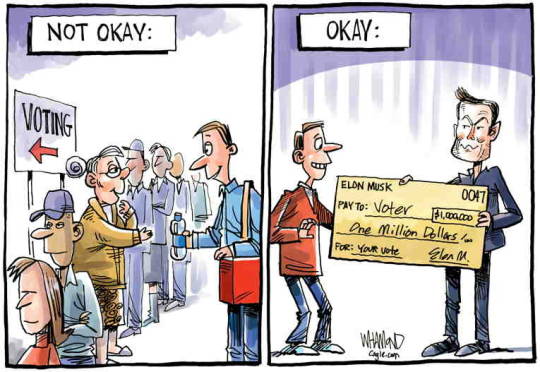
15 notes
·
View notes
Text
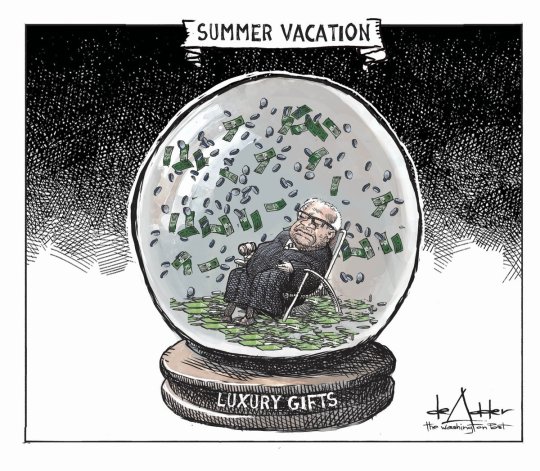
#editorial cartoons#michael de adder#snow globe#clarence thomas#supreme court#justice 'uncle' thomas#corruption#scotus#political cartoon
4 notes
·
View notes
Text
There’s no such thing as “shareholder supremacy”
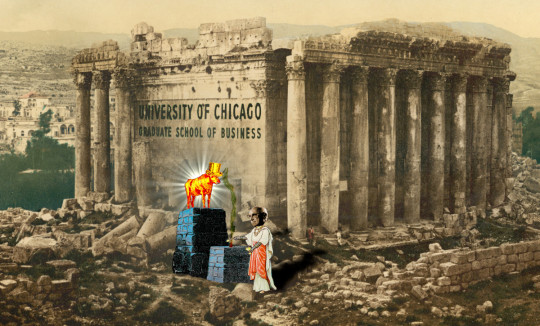
On SEPTEMBER 24th, I'll be speaking IN PERSON at the BOSTON PUBLIC LIBRARY!

Here's a cheap trick: claim that your opponents' goals are so squishy and qualitative that no one will ever be able to say whether they've been succeeded or failed, and then declare that your goals can be evaluated using crisp, objective criteria.
This is the whole project of "economism," the idea that politics, with its emphasis on "fairness" and other intangibles, should be replaced with a mathematical form of economics, where every policy question can be reduced to an equation…and then "solved":
https://pluralistic.net/2023/03/28/imagine-a-horse/#perfectly-spherical-cows-of-uniform-density-on-a-frictionless-plane
Before the rise of economism, it was common to speak of its subjects as "political economy" or even "moral philosophy" (Adam Smith, the godfather of capitalism, considered himself a "moral philosopher"). "Political economy" implicitly recognizes that every policy has squishy, subjective, qualitative dimensions that don't readily boil down to math.
For example, if you're asking about whether people should have the "freedom" to enter into contracts, it might be useful to ask yourself how desperate your "free" subject might be, and whether the entity on the other side of that contract is very powerful. Otherwise you'll get "free contracts" like "I'll sell you my kidneys if you promise to evacuate my kid from the path of this wildfire."
The problem is that power is hard to represent faithfully in quantitative models. This may seem like a good reason to you to be skeptical of modeling, but for economism, it's a reason to pretend that the qualitative doesn't exist. The method is to incinerate those qualitative factors to produce a dubious quantitative residue and do math on that:
https://locusmag.com/2021/05/cory-doctorow-qualia/
Hence the famous Ely Devons quote: "If economists wished to study the horse, they wouldn’t go and look at horses. They’d sit in their studies and say to themselves, ‘What would I do if I were a horse?’"
https://pluralistic.net/2022/10/27/economism/#what-would-i-do-if-i-were-a-horse
The neoliberal revolution was a triumph for economism. Neoliberal theorists like Milton Friedman replaced "political economy" with "law and economics," the idea that we should turn every one of our complicated, nuanced, contingent qualitative goals into a crispy defined "objective" criteria. Friedman and his merry band of Chicago School economists replaced traditional antitrust (which sought to curtail the corrupting power of large corporations) with a theory called "consumer welfare" that used mathematics to decide which monopolies were "efficient" and therefore good (spoiler: monopolists who paid Friedman's pals to do this mathematical analysis always turned out to be running "efficient" monopolies):
https://pluralistic.net/2022/02/20/we-should-not-endure-a-king/
One of Friedman's signal achievements was the theory of "shareholder supremacy." In 1970, the New York Times published Friedman's editorial "The Social Responsibility of Business Is to Increase Its Profits":
https://www.nytimes.com/1970/09/13/archives/a-friedman-doctrine-the-social-responsibility-of-business-is-to.html
In it, Friedman argued that corporate managers had exactly one job: to increase profits for shareholders. All other considerations – improving the community, making workers' lives better, donating to worthy causes or sponsoring a little league team – were out of bounds. Managers who wanted to improve the world should fund their causes out of their paychecks, not the corporate treasury.
Friedman cloaked his hymn to sociopathic greed in the mantle of objectivism. For capitalism to work, corporations have to solve the "principal-agent" problem, the notoriously thorny dilemma created when one person (the principal) asks another person (the agent) to act on their behalf, given the fact that the agent might find a way to line their own pockets at the principal's expense (for example, a restaurant server might get a bigger tip by offering to discount diners' meals).
Any company that is owned by stockholders and managed by a CEO and other top brass has a huge principal-agent problem, and yet, the limited liability, joint-stock company had produced untold riches, and was considered the ideal organization for "capital formation" by Friedman et al. In true economismist form, Friedman treated all the qualitative questions about the duty of a company as noise and edited them out of the equation, leaving behind a single, elegant formulation: "a manager is doing their job if they are trying to make as much money as possible for their shareholders."
Friedman's formulation was a hit. The business community ran wild with it. Investors mistook an editorial in the New York Times for an SEC rulemaking and sued corporate managers on the theory that they had a "fiduciary duty" to "maximize shareholder value" – and what's more, the courts bought it. Slowly and piecemeal at first, but bit by bit, the idea that rapacious greed was a legal obligation turned into an edifice of legal precedent. Business schools taught it, movies were made about it, and even critics absorbed the message, insisting that we needed to "repeal the law" that said that corporations had to elevate profit over all other consideration (not realizing that no such law existed).
It's easy to see why shareholder supremacy was so attractive for investors and their C-suite Renfields: it created a kind of moral crumple-zone. Whenever people got angry at you for being a greedy asshole, you could shrug and say, "My hands are tied: the law requires me to run the business this way – if you don't believe me, just ask my critics, who insist that we must get rid of this law!"
In a long feature for The American Prospect, Adam M Lowenstein tells the story of how shareholder supremacy eventually came into such wide disrepute that the business lobby felt that it had to do something about it:
https://prospect.org/power/2024-09-17-ponzi-scheme-of-promises/
It starts in 2018, when Jamie Dimon and Warren Buffett decried the short-term, quarterly thinking in corporate management as bad for business's long-term health. When Washington Post columnist Steve Pearlstein wrote a column agreeing with them and arguing that even moreso, businesses should think about equities other than shareholder returns, Jamie Dimon lost his shit and called Pearlstein to call it "the stupidest fucking column I’ve ever read":
https://www.washingtonpost.com/news/wonk/wp/2018/06/07/will-ending-quarterly-earnings-guidance-free-ceos-to-think-long-term/
But the dam had broken. In the months and years that followed, the Business Roundtable would adopt a series of statements that repudiated shareholder supremacy, though of course they didn't admit it. Rather, they insisted that they were clarifying that they'd always thought that sometimes not being a greedy asshole could be good for business, too. Though these statements were nonbinding, and though the CEOs who signed them did so in their personal capacity and not on behalf of their companies, capitalism's most rabid stans treated this as an existential crisis.
Lowenstein identifies this as the forerunner to today's panic over "woke corporations" and "DEI," and – just as with "woke capitalism" – the whole thing amounted to a a PR exercise. Lowenstein links to several studies that found that the CEOs who signed onto statements endorsing "stakeholder capitalism" were "more likely to lay off employees during COVID-19, were less inclined to contribute to pandemic relief efforts, had 'higher rates of environmental and labor-related compliance violations,”' emitted more carbon into the atmosphere, and spent more money on dividends and buybacks."
One researcher concluded that "signing this statement had zero positive effect":
https://www.theatlantic.com/ideas/archive/2020/08/companies-stand-solidarity-are-licensing-themselves-discriminate/614947
So shareholder supremacy isn't a legal obligation, and statements repudiating shareholder supremacy don't make companies act any better.
But there's an even more fundamental flaw in the argument for the shareholder supremacy rule: it's impossible to know if the rule has been broken.
The shareholder supremacy rule is an unfalsifiable proposition. A CEO can cut wages and lay off workers and claim that it's good for profits because the retained earnings can be paid as a dividend. A CEO can raise wages and hire more people and claim it's good for profits because it will stop important employees from defecting and attract the talent needed to win market share and spin up new products.
A CEO can spend less on marketing and claim it's a cost-savings. A CEO can spend more on marketing and claim it's an investment. A CEO can eliminate products and call it a savings. A CEO can add products and claim they're expansions into new segments. A CEO can settle a lawsuit and claim they're saving money on court fees. A CEO can fight a lawsuit through to the final appeal and claim that they're doing it to scare vexatious litigants away by demonstrating their mettle.
CEOs can use cheaper, inferior materials and claim it's a savings. They can use premium materials and claim it's a competitive advantage that will produce new profits. Everything a company does can be colorably claimed as an attempt to save or make money, from sponsoring the local little league softball team to treating effluent to handing ownership of corporate landholdings to perpetual trusts that designate them as wildlife sanctuaries.
Bribes, campaign contributions, onshoring, offshoring, criminal conspiracies and conference sponsorships – there's a business case for all of these being in line with shareholder supremacy.
Take Boeing: when the company smashed its unions and relocated key production to scab plants in red states, when it forced out whistleblowers and senior engineers who cared about quality, when it outsourced design and production to shops around the world, it realized a savings. Today, between strikes, fines, lawsuits, and a mountain of self-inflicted reputational harm, the company is on the brink of ruin. Was Boeing good to its shareholders? Well, sure – the shareholders who cashed out before all the shit hit the fan made out well. Shareholders with a buy-and-hold posture (like the index funds that can't sell their Boeing holdings so long as the company is in the S&P500) got screwed.
Right wing economists criticize the left for caring too much about "how big a slice of the pie they're getting" rather than focusing on "growing the pie." But that's exactly what Boeing management did – while claiming to be slaves to Friedman's shareholder supremacy. They focused on getting a bigger slice of the pie, screwing their workers, suppliers and customers in the process, and, in so doing, they made the pie so much smaller that it's in danger of disappearing altogether.
Here's the principal-agent problem in action: Boeing management earned bonuses by engaging in corporate autophagia, devouring the company from within. Now, long-term shareholders are paying the price. Far from solving the principal-agent problem with a clean, bright-line rule about how managers should behave, shareholder supremacy is a charter for doing whatever the fuck a CEO feels like doing. It's the squishiest rule imaginable: if someone calls you cruel, you can blame the rule and say you had no choice. If someone calls you feckless, you can blame the rule and say you had no choice. It's an excuse for every season.
The idea that you can reduce complex political questions – like whether workers should get a raise or whether shareholders should get a dividend – to a mathematical rule is a cheap sleight of hand. The trick is an obvious one: the stuff I want to do is empirically justified, while the things you want are based in impossible-to-pin-down appeals to emotion and its handmaiden, ethics. Facts don't care about your feelings, man.
But it's feelings all the way down. Milton Friedman's idol-worshiping cult of shareholder supremacy was never about empiricism and objectivity. It's merely a gimmick to make greed seem scientifically optimal.

The paperback edition of The Lost Cause, my nationally bestselling, hopeful solarpunk novel is out this month!

If you'd like an essay-formatted version of this post to read or share, here's a link to it on pluralistic.net, my surveillance-free, ad-free, tracker-free blog:
https://pluralistic.net/2024/09/18/falsifiability/#figleaves-not-rubrics/a>
#pluralistic#chevron deference#loper bright#scotus#stakeholder capitalism#boeing#economism#economics#milton friedman#shareholder supremacy#fiduciary duty#business#we cant have nice things#shareholder capitalism
365 notes
·
View notes
Text
From: Occupied Democrats
BREAKING: Indicted 2024 Republican presidential candidate Donald Trump is hit with devastating news as the biggest and most influential newspaper in the entire state of Texas endorses President Biden and tears Donald Trump to pieces.
But it gets even WORSE for Donald Trump…
The editorial board of The Houston Chronicle not only ripped into the MAGA cult leader, they laid out in plain black and white exactly why every American should vote for Joe Biden.
They write that Biden will "make life better" for the American people, has made our economy "healthier," and will crucially prevent the "chaos, corruption and danger to the nation" that would so clearly come from Trump getting a second term in the White House.
They state that the Biden administration has "performed remarkably well, despite the rancor and divisiveness that have afflicted this nation for nearly a decade."
The board concedes that Biden "has his shortcomings" like every other president, but says that he has a historic number of achievements that serve as a "potent reminder to his fellow Democrats, to independents and to those Republicans who have somehow resisted Trump's cultish appeal that the nation has a viable alternative."
In addition to his massive economic victories, they praise Biden's effort to curtail gun violence, his introduction of a price cap on insulin, and his astonishing success at uniting the world against Putin's "brutish" invasion of Ukraine.
When mentioning the situation along the southern border, the board writes that "blame primarily belongs to caviling and cynical MAGA Republicans in the House.
"In servility to Trump, they torpedoed a bipartisan border-security plan painstakingly crafted in the Senate. Biden can't solve the crisis by executive order; he needs Congress to act," the board writes.
At another point in the piece, the board easily dispatches the bad faith attacks on Biden's age, saying that he has "forgotten more than his presumed Republican rival will ever know. That's not saying much, and at the same time, it says it all."
Predictably, prominent MAGA figures are completely melting down over the editorial — because they know precisely how influential this newspaper is in Texas. Clearly, The Houston Chronicle has struck a nerve.
721 notes
·
View notes
Note
lol philadelphia inquirer bodying nyt
https://www.inquirer.com/opinion/editorials/first-presidential-debate-joe-biden-donald-trump-withdraw-20240629.html
President Joe Biden’s debate performance was a disaster. His disjointed responses and dazed look sparked calls for him to drop out of the presidential race.
But lost in the hand wringing was Donald Trump’s usual bombastic litany of lies, hyperbole, bigotry, ignorance, and fear mongering. His performance demonstrated once again that he is a danger to democracy and unfit for office.
In fact, the debate about the debate is misplaced. The only person who should withdraw from the race is Trump.
Trump, 78, has been on the political stage for eight years marked by chaos, corruption, and incivility. Why go back to that?
To build himself up, Trump constantly tears the country down. There is no shining city on the hill. It’s just mourning in America.
Throughout the debate, Trump repeatedly said we are a “failing” country. He called the United States a “third world nation.” He said, “we’re living in hell” and “very close to World War III.”
“People are dying all over the place,” Trump said, later adding “we’re literally an uncivilized country now.”
Trump told more than 30 lies during the debate to go with the more than 30,000 mistruths told during his four years as president. He dodged the CNN moderators’ questions, took no responsibility for his actions, and blamed others, mainly Biden, for everything that is wrong in the world.
Trump’s response to the Jan. 6, 2021, insurrection he fueled was farcical. He said a “relatively small number of people” went to the Capitol and many were “ushered in by the police.”
After scheming to overturn the 2020 election, Trump refused to say if he would accept the results of the 2024 election. Unless, of course, he wins.
The debate served as a reminder of what another four years of Trump would look like. More lies, grievance, narcissism, and hate. Supporters say they like Trump because he says whatever he thinks. But he mainly spews raw sewage.
Trump attacks the military. He denigrates the Justice Department and judges. He belittles the FBI and the CIA. He picks fights with allies and cozies up to dictators.
Trump is an unserious carnival barker running for the most serious job in the world. During his last term, Trump served himself and not the American people.
Trump spent chunks of time watching TV, tweeting, and hanging out at his country clubs. Over his four-year term, Trump played roughly 261 rounds of golf.
As president, Trump didn’t read the daily intelligence briefs. He continued to use his personal cell phone, allowing Chinese spies to listen to his calls. During one Oval Office meeting, Trump shared highly classified intelligence with the Russian foreign minister and ambassador.
Trump’s term did plenty of damage and had few accomplishments. The much-hyped wall didn’t get built. Infrastructure week was a recurring joke. Giant tax cuts made the rich richer, while fueling massive deficits for others to pay for years. His support for coal, oil drilling and withdrawal from the Paris Agreement worsened the growing impact of climate change.
Trump stacked the judiciary with extreme judges consisting mainly of white males, including a number who the American Bar Association rated as not qualified. A record number of cabinet officials were fired or left the office. The West Wing was in constant chaos and infighting.
Many Trump appointees exited under a cloud of corruption, grifting and ethical scandals. Trump’s children made millions off the White House. His dilettante son-in-law got $2 billion from the Saudi government for his fledgling investment firm even though he never managed money before.
Trump’s mismanagement of the pandemic resulted in tens of thousands of needless deaths. He boasts about stacking the Supreme Court with extreme right-wingers who are stripping away individual rights, upending legal precedents, and making the country less safe. If elected, Trump may add to the court’s conservative majority.
Of course, there were the unprecedented two impeachments. Now, Trump is a convicted felon who is staring at three more criminal indictments. He is running for president to stay out of prison.
If anything, Trump doesn’t deserve to be on the presidential debate stage. Why even give him a platform?
Trump allegedly stole classified information and tried to overturn an election. His plans for a second term are worse than the last one. We cannot be serious about letting such a crooked clown back in the White House.
Yes, Biden had a horrible night. He’s 81 and not as sharp as he used to be. But Biden on his worst day remains lightyears better than Trump on his best.
Biden must show that he is up to the job. This much is clear: He has a substantive record of real accomplishments, fighting the pandemic, combating climate change, investing in infrastructure, and supporting working families and the most vulnerable.
Biden has surrounded himself with experienced people who take public service seriously. He has passed major bipartisan legislation despite a dysfunctional Republican House majority.
Biden believes in the best of America. He has rebuilt relationships with allies around the world and stood up to foes like Russia and China.
There was only one person at the debate who does not deserve to be running for president. The sooner Trump exits the stage, the better off the country will be.

271 notes
·
View notes